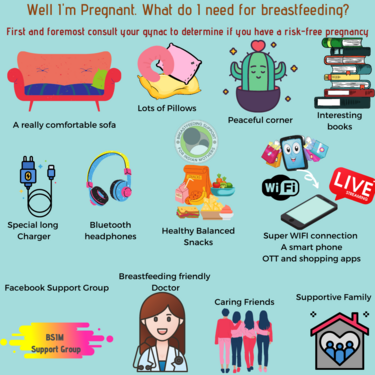Can I continue to breastfeed while I am pregnant? What do I need to know?
A lot of breastfeeding women are asked to wean their baby when they learn they are pregnant again. In a normal, healthy and low-risk pregnancy, she can continue to nurse her baby throughout the pregnancy and beyond. In cases of high-risk pregnancies (factors involving maternal age and other health conditions, history and risk of miscarriage / early labour, and pregnancy with multiples), it is important to consult the gynaecologist while making a decision about breastfeeding through pregnancy.
Myths about Breastfeeding during Pregnancy:
1)Breastfeeding during pregnancy involves the risk of miscarriage
This is not true. Research shows that in normal, healthy pregnancies, there is no risk of miscarriage if there has been no previous history of miscarriage in the first 20 weeks.
2) Breastfeeding during pregnancy could bring preterm labour
It is a typical concern that nipple stimulation while breastfeeding triggers oxytocin rush which can trigger uterine contractions leading to early or preterm labour. This concern is not of any weightage in a low-risk, healthy pregnancy. Oxytocin can cause uterine contractions but they are normal in pregnancies. Also, oxytocin is released during sexual intercourse too, which a lot of couples continue to do throughout pregnancy. The uterus is equipped to prevent a reaction to oxytocin which can cause labour. In fact, the uterus’s sensitivity to oxytocin is increased only when true labour approaches. The oxytocin released due to nipple stimulation is also less during pregnancy.
3) Breastfeeding during pregnancy can deprive both the mother and her unborn child of some nutrients
This is not true. However, a pregnant breastfeeding woman is recommended to eat a healthy and balanced diet and get plenty of rest. A well-nourished mother is able to pass on the nutrients to her unborn baby and be at no risk of malnutrition herself either.
4) Nursing baby takes away the colostrum (made during pregnancy) meant for the unborn baby
This is a false belief. Breasts continue to make colostrum for the newborn after birth no matter how much colostrum the older nursing baby may have consumed during pregnancy.
Advantages of Breastfeeding
For the mother, breastfeeding during pregnancy continues to reduce her risk for breast cancer. It does not increase her risk for osteoporosis.
For the nursing baby, her mother’s milk continues to meet her nutritional needs. This can be especially true when the nursing baby is younger than 2 years old. Anecdotal reports have suggested that the colostrum produced during pregnancy has substantially reduced and even cured certain allergies in the nursing baby. Along with these physiological benefits, breastfeeding during pregnancy helps meet the nursing baby’s emotional needs and promotes a sense of security.
Changes in Milk and Supply during pregnancy
1. Drop in the supply
The majority of breastfeeding women experience a decrease in their supply during pregnancy. The drop is usually noticeable by mid pregnancy, but some women feel it right from the first month. The hormonal changes during pregnancy interfere with the demand and supply rule. This is the reason why the supply decreases even when the frequency of nursing isn’t reduced. In fact, in many cases, the supply decreases in spite of an increase in the nursing frequency.
2. Changes in the composition of the milk
A study on the changes in the milk composition of women nursing during pregnancy showed that they are equivalent to the changes in the milk composition of a breastfeeding mother who is gradually weaning her child off. There is increased sodium and protein whereas decreased glucose and lactose.
3. Changes in the taste of the milk
As the supply decreases, the taste of breast milk changes as well. This change is also congruent with a gradual weaning process. The milk becomes saltier and less sweet.
4. Production of colostrum
A breastfeeding mother starts producing colostrum anytime between 4-8 months of her pregnancy. For some mothers, it may be earlier than that. The last couple of months of pregnancy are usually when only colostrum is produced by the breastfeeding mother. She continues to produce it even after birth and her mature milk comes in at around the 3rd or 4th day as usual.
Effects of milk and supply changes on the nursing baby :
Some babies become fussier due to the hit that the supply takes during pregnancy. Most babies cope with it by increasing their dependence on solids. In some cases, a baby might wean. However, most babies continue to nurse through their mother’s pregnancy, albeit, the frequency may come down.
Some babies do not like the changed taste of breast milk as it tastes more like colostrum. Whereas some babies may like it. Some babies don’t notice the change.
The laxative effect of colostrum sometimes makes the nursing baby poop more frequently. The baby may even have loose motion sometimes. However, it is temporary. As soon as the mature milk comes in (post-birth), the laxative effect is diminished.
Effects of pregnancy on the breastfeeding mother :
1. Tiredness
Breastfeeding during pregnancy can be fulfilling, but also challenging. Some common experiences include exhaustion and calcium/vitamin deficiencies. Both of which can be addressed by consuming a healthy and balanced diet and by taking supplements, if required.
2. Nipple sensitivity
Nipples have increased sensitivity during pregnancy, thanks to the pregnancy hormones. This could lead to sore nipples while breastfeeding. Ensuring a deep latch, discouraging distraction and limiting nursing time etc can help in managing the soreness. Some mothers have found that increasing fluid consumption is helpful.
3. Nursing aversions
Many women experience nursing aversions during pregnancy. It happens due to the hormonal changes that the pregnancy brings about. Aversions can be very difficult to deal with. More information can be found here.
Coping Strategies :
It can be both blissful and strenuous to continue breastfeeding through pregnancy. Some coping strategies may come in handy.
The mother can continue to nurse on demand to prevent the supply from going further down. Experts are in disagreement about consuming herbs to increase the supply as it can potentially adversely affect pregnancy.
Nursing lying down can be helpful to catch up with some rest.
The mother can introduce some boundaries to cope with exhaustion and/or aversions. More information here.
Pumping during Pregnancy:
In a low-risk, healthy pregnancy, pumping to provide milk for the current baby is supposed to be as safe as directly breastfeeding during pregnancy. Many mothers who work outside the house continue to pump for the first baby while pregnant with the second. However, most mothers see a sharp decline in the output just how directly breastfeeding mothers see a drop in their supply during pregnancy.
Pumping during pregnancy for reasons other than providing for the current baby should be considered only in some exceptional situations under the guidance of a medical professional.
References:
https://www.llli.org/breastfeeding-info/breastfeeding-pregnancy-tandem-nursing/
https://www.laleche.org.uk/pregnant-and-breastfeeding/
https://kellymom.com/tandem-faq/01safety/
https://kellymom.com/tandem-faq/16milkchanges/
https://kellymom.com/pregnancy/bf-preg/bfpregnancy_safety/
https://www.breastfeeding.asn.au/bf-info/breastfeeding-through-pregnancy-and-beyond#
https://kellymom.com/tandem-faq/05pumping/
https://kellymom.com/category/tandem-faq/

Wish to speak with a member of our team who is a certified lactation professional and also an experienced breastfeeding mother, click on this link.
Medical Advice Disclaimer
THIS WEBSITE DOES NOT PROVIDE MEDICAL ADVICE.
The information, including but not limited to, text, graphics, images and other material contained on this website are for informational purposes only. No material on this site is intended to be a substitute for professional medical advice, diagnosis or treatment. Always seek the advice of your physician or other qualified health care provider with any questions you may have regarding a medical condition or treatment before undertaking a new health care regimen, and never disregard professional medical advice or delay in seeking it because of something you have read on this website.
Disclaimer
We understand and acknowledge that parents and babies can be of various genders on a spectrum of LGBTQI+. Families come in diverse flavours. However, in our articles, for the sake of simplicity and convenience, we will be referring to the breastfeeding parent as the mother and using the female pronouns- ‘she’ and ‘her’ for babies. Babies can be nourished and nurtured in different ways and while we have used the terms breastfeeding and nursing, we recognize that parents can opt to chest feed or finger feed.
We don’t have conflicts of interest and declare, and we are compliant with the WHO code of marketing of breastmilk substitutes and the IMS act.
In case you find any information on this website that needs to be updated, please write to us at info@bsim.org.in






